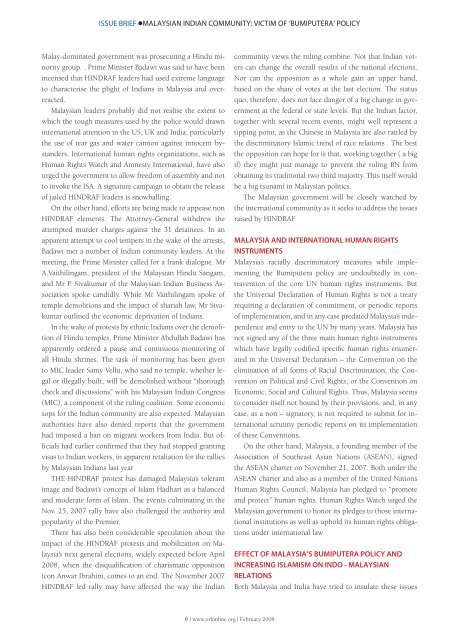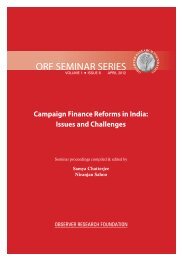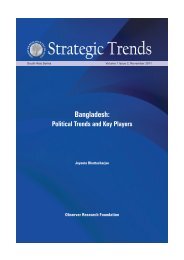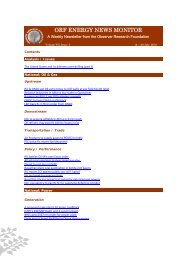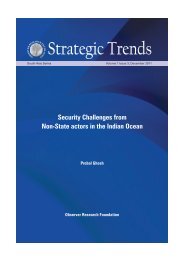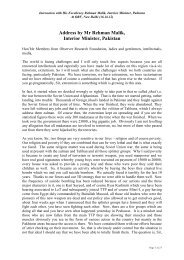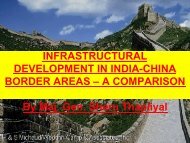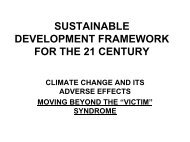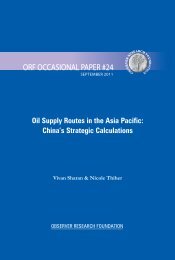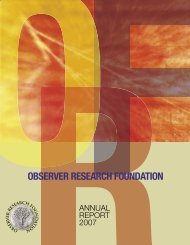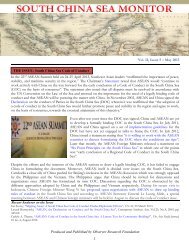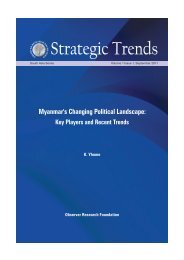Malaysian Indian Community: Victim of 'Bumiputera' Policy
Malaysian Indian Community: Victim of 'Bumiputera' Policy
Malaysian Indian Community: Victim of 'Bumiputera' Policy
Create successful ePaper yourself
Turn your PDF publications into a flip-book with our unique Google optimized e-Paper software.
ISSUE BRIEF ●MALAYSIAN INDIAN COMMUNITY: VICTIM OF ‘BUMIPUTERA’ POLICY<br />
Malay-dominated government was prosecuting a Hindu minority<br />
group. . Prime Minister Badawi was said to have been<br />
incensed that HINDRAF leaders had used extreme language<br />
to characterise the plight <strong>of</strong> <strong>Indian</strong>s in Malaysia and overreacted.<br />
<strong>Malaysian</strong> leaders probably did not realise the extent to<br />
which the tough measures used by the police would drawn<br />
international attention in the US, UK and India, particularly<br />
the use <strong>of</strong> tear gas and water cannon against innocent bystanders.<br />
International human rights organizations, such as<br />
Human Rights Watch and Amnesty International, have also<br />
urged the government to allow freedom <strong>of</strong> assembly and not<br />
to invoke the ISA. A signature campaign to obtain the release<br />
<strong>of</strong> jailed HINDRAF leaders is snowballing.<br />
On the other hand, efforts are being made to appease non<br />
HINDRAF elements. The Attorney-General withdrew the<br />
attempted murder charges against the 31 detainees. In an<br />
apparent attempt to cool tempers in the wake <strong>of</strong> the arrests,<br />
Badawi met a number <strong>of</strong> <strong>Indian</strong> community leaders. At the<br />
meeting, the Prime Minister called for a frank dialogue. Mr<br />
A.Vaithilingam, president <strong>of</strong> the <strong>Malaysian</strong> Hindu Sangam,<br />
and Mr P. Sivakumar <strong>of</strong> the <strong>Malaysian</strong> <strong>Indian</strong> Business Association<br />
spoke candidly. While Mr Vaithilingam spoke <strong>of</strong><br />
temple demolitions and the impact <strong>of</strong> shariah law, Mr Sivakumar<br />
outlined the economic deprivation <strong>of</strong> <strong>Indian</strong>s.<br />
In the wake <strong>of</strong> protests by ethnic <strong>Indian</strong>s over the demolition<br />
<strong>of</strong> Hindu temples, Prime Minister Abdullah Badawi has<br />
apparently ordered a pause and continuous monitoring <strong>of</strong><br />
all Hindu shrines. The task <strong>of</strong> monitoring has been given<br />
to MIC leader Samy Vellu, who said no temple, whether legal<br />
or illegally built, will be demolished without “thorough<br />
check and discussions” with his <strong>Malaysian</strong> <strong>Indian</strong> Congress<br />
(MIC), a component <strong>of</strong> the ruling coalition. Some economic<br />
sops for the <strong>Indian</strong> community are also expected. <strong>Malaysian</strong><br />
authorities have also denied reports that the government<br />
had imposed a ban on migrant workers from India. But <strong>of</strong>ficials<br />
had earlier confirmed that they had stopped granting<br />
visas to <strong>Indian</strong> workers, in apparent retaliation for the rallies<br />
by <strong>Malaysian</strong> <strong>Indian</strong>s last year<br />
THE HINDRAF protest has damaged Malaysia’s tolerant<br />
image and Badawi’s concept <strong>of</strong> Islam Hadhari as a balanced<br />
and moderate form <strong>of</strong> Islam. The events culminating in the<br />
Nov. 25, 2007 rally have also challenged the authority and<br />
popularity <strong>of</strong> the Premier.<br />
There has also been considerable speculation about the<br />
impact <strong>of</strong> the HINDRAF protests and mobilization on Malaysia’s<br />
next general elections, widely expected before April<br />
2008, when the disqualification <strong>of</strong> charismatic opposition<br />
icon Anwar Ibrahim, comes to an end. The November 2007<br />
HINDRAF led rally may have affected the way the <strong>Indian</strong><br />
community views the ruling combine. Not that <strong>Indian</strong> voters<br />
can change the overall results <strong>of</strong> the national elections.<br />
Nor can the opposition as a whole gain an upper hand,<br />
based on the share <strong>of</strong> votes at the last election. The status<br />
quo, therefore, does not face danger <strong>of</strong> a big change in government<br />
at the federal or state levels. But the <strong>Indian</strong> factor,<br />
together with several recent events, might well represent a<br />
tipping point, as the Chinese in Malaysia are also rattled by<br />
the discriminatory Islamic trend <strong>of</strong> race relations . The best<br />
the opposition can hope for is that, working together ( a big<br />
if) they might just manage to prevent the ruling BN from<br />
obtaining its traditional two third majority. This itself would<br />
be a big tsunami in <strong>Malaysian</strong> politics.<br />
The <strong>Malaysian</strong> government will be closely watched by<br />
the international community as it seeks to address the issues<br />
raised by HINDRAF.<br />
MALAYSIA AND INTERNATIONAL HUMAN RIGHTS<br />
INSTRUMENTS<br />
Malaysia’s racially discriminatory measures while implementing<br />
the Bumiputera policy are undoubtedly in contravention<br />
<strong>of</strong> the core UN human rights instruments. But<br />
the Universal Declaration <strong>of</strong> Human Rights is not a treaty<br />
requiring a declaration <strong>of</strong> commitment, or periodic reports<br />
<strong>of</strong> implementation, and in any case predated Malaysia’s independence<br />
and entry to the UN by many years. Malaysia has<br />
not signed any <strong>of</strong> the three main human rights instruments<br />
which have legally codified specific human rights enumerated<br />
in the Universal Declaration – the Convention on the<br />
elimination <strong>of</strong> all forms <strong>of</strong> Racial Discrimination, the Convention<br />
on Political and Civil Rights, or the Convention on<br />
Economic, Social and Cultural Rights. Thus, Malaysia seems<br />
to consider itself not bound by their provisions, and, in any<br />
case, as a non – signatory, is not required to submit for international<br />
scrutiny periodic reports on its implementation<br />
<strong>of</strong> these Conventions.<br />
On the other hand, Malaysia, a founding member <strong>of</strong> the<br />
Association <strong>of</strong> Southeast Asian Nations (ASEAN), signed<br />
the ASEAN charter on November 21, 2007. Both under the<br />
ASEAN charter and also as a member <strong>of</strong> the United Nations<br />
Human Rights Council, Malaysia has pledged to “promote<br />
and protect” human rights. Human Rights Watch urged the<br />
<strong>Malaysian</strong> government to honor its pledges to those international<br />
institutions as well as uphold its human rights obligations<br />
under international law<br />
EFFECT OF MALAYSIA’S BUMIPUTERA POLICY AND<br />
INCREASING ISLAMISM ON INDO - MALAYSIAN<br />
RELATIONS<br />
Both Malaysia and India have tried to insulate these issues<br />
6 | www.orfonline.org | February 2008


